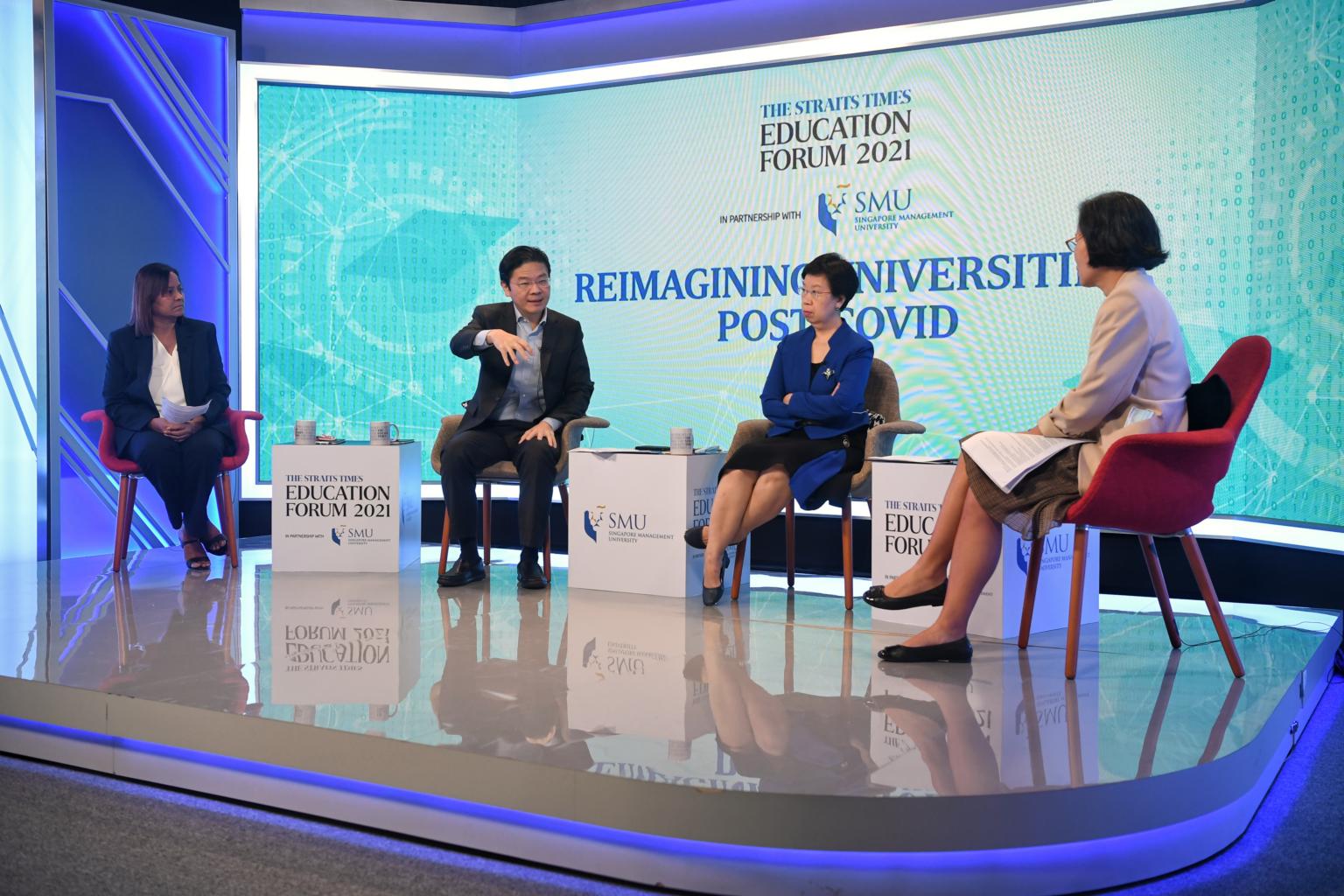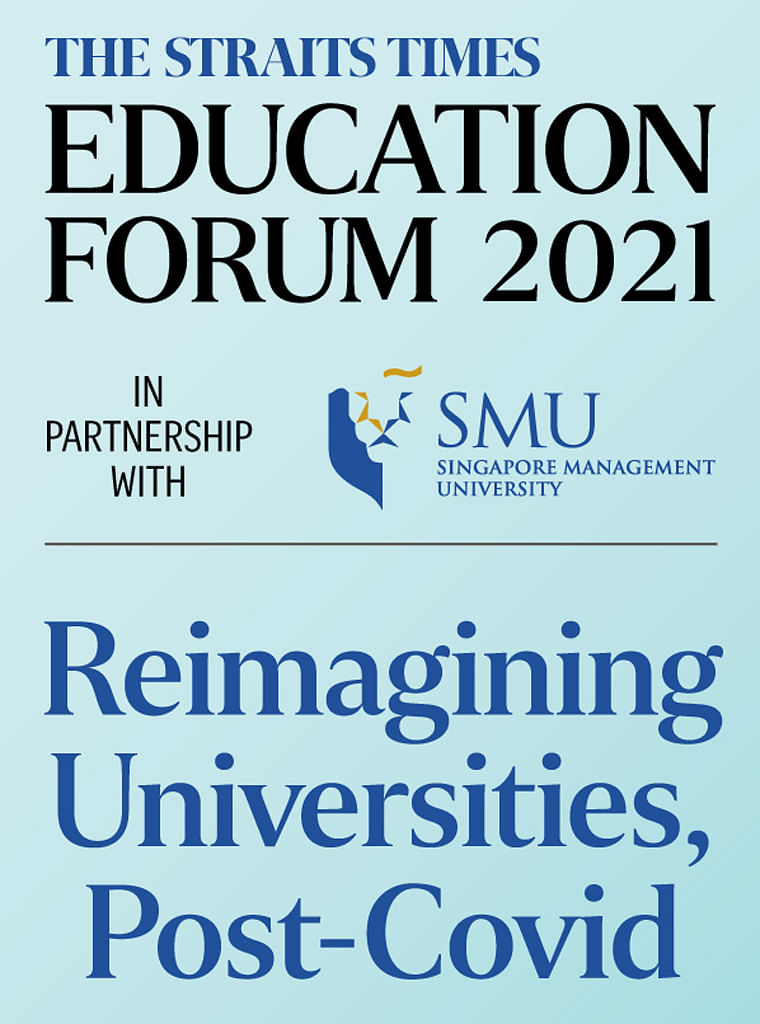ST Education Forum: Lawrence Wong on 3 ways in which S'pore universities can transform themselves
Sign up now: Get tips on how to help your child succeed

(From left) ST senior education correspondent Sandra Davie; Education Minister Lawrence Wong; SMU president Lily Kong; and Ms Lydia Lim, ST's head of schools and education products.
ST PHOTO: KUA CHEE SIONG
SINGAPORE - As Covid-19 pushes learning institutes to transform, universities in Singapore must disrupt themselves or be forced to do so.
Education Minister Lawrence Wong stressed this on Friday (Feb 5) as he laid out three areas in which Singapore universities can do better.
Even before Covid-19, there was talk that the university sector would be completely disrupted by technology. The pandemic has prompted more questions about such trends, and there are now further predictions in some countries that there will be so much disruption that some universities may have to close, said Mr Wong.
"We are not immune to these trends... But our approach has been not to allow external forces to disrupt us, but to proactively disrupt ourselves instead."
There are, therefore, three ways in which universities in Singapore can do better - in teaching and learning, embracing lifelong learning, and collaborating with industry, he noted.
He was speaking at The Straits Times Education Forum 2021 on reimagining universities post-Covid-19, held in partnership with the Singapore Management University (SMU).
The forum, held online this year, examined the ripple effects of the coronavirus pandemic on higher education and the changes that it will forge.
Doing better in teaching and learning
The criticism that universities prioritise research over teaching is not new, but is not always fair, said Mr Wong.
"In my experience, some of the best researchers are also excellent and most inspiring teachers. But this criticism exists, and we are aware of it."
Globally, there are also criticisms that the university curriculum has not changed much.
"But in Singapore, we've continually been looking at ways to refresh and update the quality of teaching and learning in our universities. So the university course in Singapore today is quite different from what it was 100 years ago - even 10, five years ago," he said.
Students also get opportunities to learn outside of lectures - seminars, collaborative projects, overseas opportunities, service-based learning, internships and capstone projects.
"More recently, all our universities are looking at ways to provide more holistic learning... We are also looking at greater breadth, and more interdisciplinary and cross domain knowledge, for example, in areas like digital literacy, innovation, entrepreneurship and communication," the minister said.
Embracing lifelong learning
The model of university education everywhere, for a long time, has been about front-loading education at a young age, Mr Wong noted.
"So you have a fixed period of education, and then after that a fixed period of work.
"I think that model is no longer relevant today. We need to have a rotational model of learning where work and education are rotated over the course of your career."

This means that universities will have to cater for multiple entry points along the age distribution, rather than focusing on full-time education, he said.
This could entail looking at offering part-time degrees for working adults and modular offerings that can be stacked towards a qualification later on.
Universities must also cater for multiple entry points along the entire skills spectrum, including technical, hands-on skills, practical life skills and even social skills like relationship negotiation.
"So the university of the future needs to be plural, rather than singular. It should be more of a 'multi-versity', rather than a university."
Collaborating closely with industry
Universities can and must continue to do more in this area, said Mr Wong, adding: "When universities don't move fast enough, they become at risk of being disrupted."
This trend has been observed internationally, when large companies decide to set up their own academies, partly out of frustration that the universities in their countries are unable to produce graduates to meet their needs.
One example Mr Wong cited is the Dyson Institute, set up because of the difficulties in getting engineering graduates in Britain.
To meet this engineering skills gap, the Dyson Institute offered degrees in partnership with the University of Warwick. It has currently been granted its own degree-awarding powers, which means it has become "a university in its own right", the minister noted.
"I don't think we need to go there in Singapore, but our universities should therefore strengthen and deepen their collaboration with companies here in Singapore."
The polytechnics are doing well in getting industry inputs on school curriculum, and the universities increasingly will also have to take a leaf from the poly sector's book, Mr Wong said.
Noting the critical roles of universities to the well-being of Singapore and Singaporeans, Mr Wong said: "I hope to see universities of the future becoming centres of learning, nurturing a broad range of skills, having close collaboration with the industry, and nurturing everyone to be a lifelong learner.
"And as our universities continue to rebuild and reimagine themselves, they will play a very important role in shaping the future of our society."


